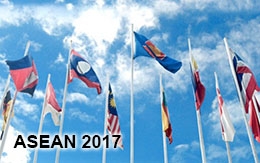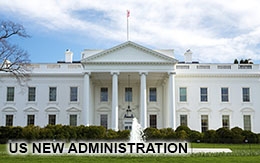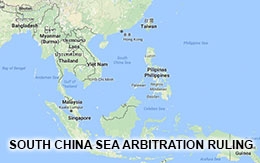Search result for "ASEAN"
-
Developing ASEAN’s Navies and MLEAs Roles in the Indo-Pacific amidst Competition
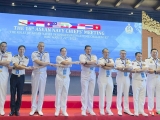 Category: SecurityASEAN Member States’s (AMSs) are increasing naval capabilities in order to exhibit their respective power posture among ASEAN countries in general. To put it more bluntly, AMSs military have been designed to outshine its ASEAN neighbour to uphold its sovereignty, especially in disputed territories.
Category: SecurityASEAN Member States’s (AMSs) are increasing naval capabilities in order to exhibit their respective power posture among ASEAN countries in general. To put it more bluntly, AMSs military have been designed to outshine its ASEAN neighbour to uphold its sovereignty, especially in disputed territories. -
The Quad and AUKUS: A Challenge to or Reinforcement of ASEAN-Centrality?
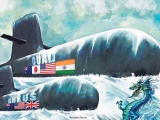 Category: Most prominent newsThis presentation will focus on two separate and distinct minilateral institutions – the Quadrilateral Security Dialogue Forum (Quad) and AUKUS. The Quad and AUKUS share the same genesis: an impelling strategic concern among their members about the economic and military rise of China in the Indo-Pacific where China has spread its influence primarily through diplomatic, political and economic inducements accompanied by intimidation and coercion in the South China Sea. This presentation will discuss whether these two institutions challenge or reinforce ASEAN’s efforts to promote maritime cooperation.
Category: Most prominent newsThis presentation will focus on two separate and distinct minilateral institutions – the Quadrilateral Security Dialogue Forum (Quad) and AUKUS. The Quad and AUKUS share the same genesis: an impelling strategic concern among their members about the economic and military rise of China in the Indo-Pacific where China has spread its influence primarily through diplomatic, political and economic inducements accompanied by intimidation and coercion in the South China Sea. This presentation will discuss whether these two institutions challenge or reinforce ASEAN’s efforts to promote maritime cooperation. -
Big Power Rivalry, ASEAN’s Dilemmas and Strategic Situation in the South China SeaCategory: Most prominent newsWhile Southeast Asia has been looking for the post-pandemic recovery the regional strategic situation continues to be defined by the rising tensions of big powers, primarily of China and the USA. These tensions are not new and emerge from the pre-pandemic years of growing regional complexity and conflicting visions of the regional order. With this international context in mind the paper aims to assess the South China Sea as a two-level problem. The dynamics at the first level is mainly defined by the ASEAN member states and at the second one – by China and the USA.
-
The focus and path of promoting the blue partnership between China and ASEANCategory:With the increasing impact of climate change and marine pollution, marine ecological and environmental problems have become increasingly prominent. At the same time, the development of marine science and technology has led to over-exploitation of marine resources, and non-sustainable marine economic model is also rapidly consuming various marine resources. This has become one of the real challenges of the Sustainable Development Goals established by the United Nations
-
The Rise of ‘Minilateralism’: The ASEAN and its Struggle for Centrality in the South China Sea
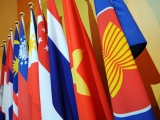 Category:The paper analyzes the intersection of three key currents in Asian geopolitics, namely (i) the emergence Association of Southeast Asian Nations (ASEAN) as a fulcrum of pan-regional integration, (ii) the evolution of South China Sea disputes as the preeminent geopolitical conflict of the 21st century, if not the site of the next great war; and, (iii) full commencement of the New Cold War between the United States (US) and China, dispensing with four decades of ‘constructive engagement’ vis-à-vis Beijing. Once seen as the harbinger of an open, inclusive and multilateralist order in the Asia-Pacific, the ASEAN has struggled to assert its ...
Category:The paper analyzes the intersection of three key currents in Asian geopolitics, namely (i) the emergence Association of Southeast Asian Nations (ASEAN) as a fulcrum of pan-regional integration, (ii) the evolution of South China Sea disputes as the preeminent geopolitical conflict of the 21st century, if not the site of the next great war; and, (iii) full commencement of the New Cold War between the United States (US) and China, dispensing with four decades of ‘constructive engagement’ vis-à-vis Beijing. Once seen as the harbinger of an open, inclusive and multilateralist order in the Asia-Pacific, the ASEAN has struggled to assert its ... -
How can the Republic of Korea promote a trilateral ROK-ASEAN-U.S. alignment?
Category: PoliticsThe geopolitical landscape of the Indo-Asia-Pacific is changing considerably, marked by growing strategic competition between major powers, particularly the U.S. and China, at the time of the mysterious Covid-19 pandemic spreading worldwide. -
The ASEAN’s Achilles Heel: Institutional Deficit and Leadership Vacuum Amid China’s South China Sea Aggression
 Category: Politics“The size of China’s displacement of the world balance is such that the world must find a new balance,” warned the late Singaporean leader Prime Minister Lee Kuan Yew. “It is not possible to pretend that this is just another big player. This is the biggest player in the history of the world.”
Category: Politics“The size of China’s displacement of the world balance is such that the world must find a new balance,” warned the late Singaporean leader Prime Minister Lee Kuan Yew. “It is not possible to pretend that this is just another big player. This is the biggest player in the history of the world.” -
ASEAN and Its Partners for Good Order at Sea: Problems and Proposals
 Category: PoliticsThis paper argues that only on a rule-based order enforced by appropriate measures can ASEAN and its partners achieve a peaceful and secure maritime environment that benefits all. To ensure safety and security amid the shifting balance of power and mounting non-traditional threats, seafarers need legal instruments such as UNCLOS signed in, a prospective regional COC between ASEAN and China, and more relevant regional institutions.
Category: PoliticsThis paper argues that only on a rule-based order enforced by appropriate measures can ASEAN and its partners achieve a peaceful and secure maritime environment that benefits all. To ensure safety and security amid the shifting balance of power and mounting non-traditional threats, seafarers need legal instruments such as UNCLOS signed in, a prospective regional COC between ASEAN and China, and more relevant regional institutions. -
ASEAN’S Long March to a Code of Conduct in the South China Sea
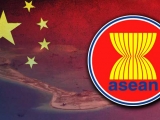 Category: PoliticsIf the past is prologue, China’s disregard for the Award and its continual militarization of its features in the South China Sea means that ASEAN’s Long March for a COC will remain a protracted one.
Category: PoliticsIf the past is prologue, China’s disregard for the Award and its continual militarization of its features in the South China Sea means that ASEAN’s Long March for a COC will remain a protracted one. -
The ‘South Sea’ and ASEAN: Failing Unity amidst Beijing’s Duplicitous Diplomacy
 Category: Working PapersThe Association of Southeast Asian Nations (ASEAN) has sought to address the challenges of the disputes in the South China Sea for close to a quarter of a century. This paper examines the circumstances and extent to which ASEAN has been effective in its response to the South China Sea dispute as well as the manner and means by which Beijing’s approach to the dispute has been influenced at the regional level.
Category: Working PapersThe Association of Southeast Asian Nations (ASEAN) has sought to address the challenges of the disputes in the South China Sea for close to a quarter of a century. This paper examines the circumstances and extent to which ASEAN has been effective in its response to the South China Sea dispute as well as the manner and means by which Beijing’s approach to the dispute has been influenced at the regional level. -
ASEAN and South China Sea in 2017
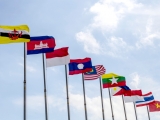 Category: Expert InterviewThe Maritime Issues conducts an interview with Kavi Chongkittavorn, a veteran ASEAN watcher who is a senior fellow at the Institute of Security and International Studies, Chulalongkorn University (Thailand) on all issues related to ASEAN and its South China Sea agenda.
Category: Expert InterviewThe Maritime Issues conducts an interview with Kavi Chongkittavorn, a veteran ASEAN watcher who is a senior fellow at the Institute of Security and International Studies, Chulalongkorn University (Thailand) on all issues related to ASEAN and its South China Sea agenda. -
Rising Trend of Maritime Power Projection in Southeast Asia: Perspective from Cambodia
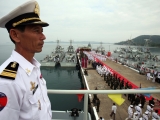 Category: PoliticsThe rising trend of maritime power projection in Southeast Asia has sparked concerns among Southeast Asian countries. As major powers increase their naval presence and influence in the region, it becomes imperative for ASEAN to respond with a more robust collective effort. By acknowledging this trend, ASEAN can work towards developing an effective and collective strategy to address these challenges.
Category: PoliticsThe rising trend of maritime power projection in Southeast Asia has sparked concerns among Southeast Asian countries. As major powers increase their naval presence and influence in the region, it becomes imperative for ASEAN to respond with a more robust collective effort. By acknowledging this trend, ASEAN can work towards developing an effective and collective strategy to address these challenges. -
DOC and COC - Best Path to Keep Waters Calm
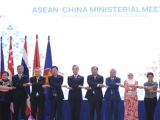 Category: International LawThis year marks the 20th anniversary of the signing of the DOC, a special year for China and ASEAN countries who are committed to peace and stability as well as maritime cooperation in the South China Sea. Taking this as an opportunity, they need to review their experience and learn lessons. Starting with building consensus and enhancing mutual trust, they need to focus on new ideas and new paths and, guided by win-win cooperation, write a new chapter on maritime cooperation and ocean governance in the South China Sea.
Category: International LawThis year marks the 20th anniversary of the signing of the DOC, a special year for China and ASEAN countries who are committed to peace and stability as well as maritime cooperation in the South China Sea. Taking this as an opportunity, they need to review their experience and learn lessons. Starting with building consensus and enhancing mutual trust, they need to focus on new ideas and new paths and, guided by win-win cooperation, write a new chapter on maritime cooperation and ocean governance in the South China Sea. -
New Mahathir Administration's South China Sea Policy
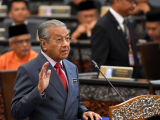 Category: PoliticsMalaysia’s approach on South China Sea under Mahathir may provide additional gain for ASEAN collectively, now that Malaysia can provide a strong voice in dealing with China on pushing for a legally binding COC.
Category: PoliticsMalaysia’s approach on South China Sea under Mahathir may provide additional gain for ASEAN collectively, now that Malaysia can provide a strong voice in dealing with China on pushing for a legally binding COC. -
Security, Politics and Diplomacy of the South China Sea Disputes
Category: VideosAs the South China Sea becomes a theatre for big power rivalry, there is a need to explore strategic policies of related powers and relations among them. It is worth investigating which factors have driven big powers’ maritime strategies and how they have perceived one another’s actions. What are these powers’ goals in the South China Sea, greater security or greater power? Are there any misperceptions or security dilemmas between claimants and between big powers? In view of rising tensions in the South China Sea, it is important to study how ASEAN has handled the maritime affairs and how the South ...
© 2016 Maritime Issues


